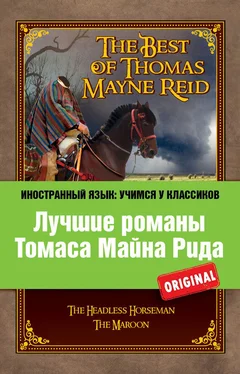asterisks – marks used to call attention
bivouac – a temporary camp, usually military
a Joseph – a chaste man; from Joseph, a biblical figure of the Old Testament
sotto voce – in a low voice ( Italian )
with his arms akimbo – with hands on the hips and elbows outwards
six-shooter – a revolver with six bullets
ma bohil– my friend ( Irish )
billet doux– a love letter ( French )
bravoes– brave men ( Spanish )
salvo– salvation ( Spanish )
cuadrilla– a gang or band ( Spanish )
salteadores– robbers ( Spanish )
Helen – in Greek mythology, an extremely beautiful woman, the daughter of Zeus, and the cause of the Trojan War
siesta – rest or sleep in the afternoon, when it is very hot outside
rebozo, topado– a cape or a scarf ( Spanish )
outré– exaggerated ( French )
equestrienne– a horse woman ( Spanish )
escalera– staircase ( Spanish )
cared a straw– did not care at all (idiom)
Pandora’s box – in Greek mythology, Pandora was the first woman made out of earth; she had a box with all kinds of evil and misery, and she opened it
haciendado– owner of the estate or the land ( Spanish )
inamorata– a sweetheart, a beloved one ( Spanish )
tomahawks – Indian weapons, small battle axes; to bury (entomb) a tomahawk means to achieve peace
desayuno– breakfast ( Spanish )
almuerzo– lunch ( Spanish )
comida– dinner ( Spanish )
y cena– and supper ( Spanish )
piazza – here: place, open place ( Italian )
peccary – a wild swine
Seminole – North American Indian tribe, known under this name since 1775
sala– sitting-room ( Spanish )
Siéntese!– Sit down! ( Spanish )
Pesosin this very sentence mean dollars . Peso was a monetary unit in Mexico and many Spanish-speaking countries
Maldita!– Damn it! ( Spanish )
Carrambo!, Carajo!, Carrai!= Deuce take it! ( Spanish )
Santíssima Virgen!– Holy Virgin! ( Spanish )
Adiós!– Goodbye! ( Spanish )
chiripé– good luck ( Spanish )
claco– a trifle ( Spanish )
Viva la guerra de los Indios!– Long live the Indian war! ( Spanish )
Houma – one of the North American Indian tribes
bayou Atchafalaya – Atchafalaya Bay, a part of the Gulf of Mexico along the southern coast of Louisiana
Condé – Louis II de Bourbon, Prince Condé (1621–1686), one of the greatest French generals of the times of King Louis XIV
the Campeador(1043–1099) – also called the Sid, the byname of Rodrigo Díaz de Vivar, Castilian national hero and military leader
Ferdinand – Ferdinand II, king of Aragon and Castile; he united different Spanish kingdoms into one nation and supported Columbus’ expeditions to America
Cortez – Hernán Cortés (1485–1547), Spanish conquistador who ruined the Aztec empire and expanded Spanish territories on the American continent
Pizarro – Francisco Pizarro (1475–1541), Spanish traveller who led many successful expeditions in Central and South America, conquired the Inca empire and founded the city of Lima
Malinché – also called Marina (1501–1550), an Indian princess; she was interpreter and mistress to Cortés during his conquest of Mexico
Eve – in the Bible, the first woman on earth, created from Adam’s rib by God; Adam and Eve lived happily in the Garden of Eden until Eve yielded to the temptation of the evil serpent
Elysium – in Greek mythology, a land of perfect happiness, the paradise to which immortal heroes were sent after death
sylph – an imaginary soulless creature that lives in the air
the old Scratch – the devil
Jehovahor Jahweh – in Judaism, the name of God; the name is thought too sacred to be said aloud
negligé – any kind of informal dress
robe de chambre= dressing-gown ( French )
reja– an iron or wooden grate ( Spanish )
Hyperion – in Greek mythology, one of the Titans
Satyr – in Greek mythology, half man, half goat; Satyrs were associated with the god Dionysus and his cult
cottonade– cotton ( Spanish )
patio – an inner courtyard in a Spanish American home
the Almighty – God; the Almighty God
saguan – here: gates ( Spanish )
Читать дальше
Конец ознакомительного отрывка
Купить книгу












